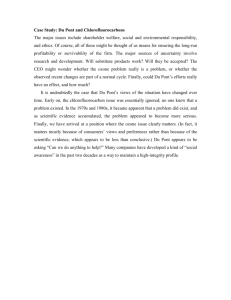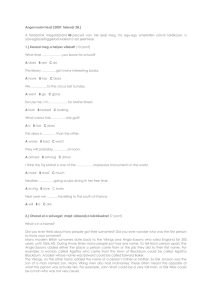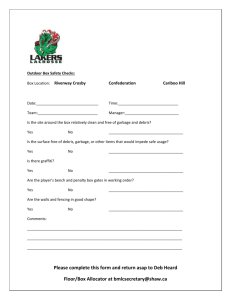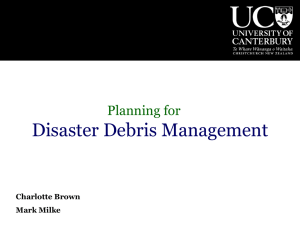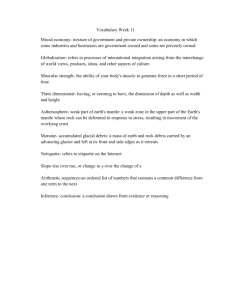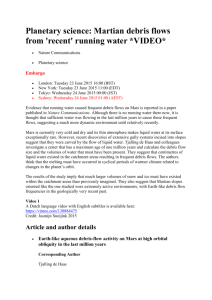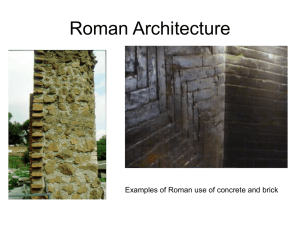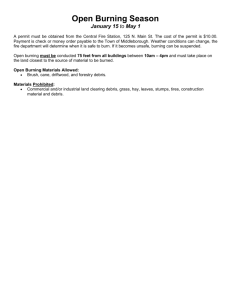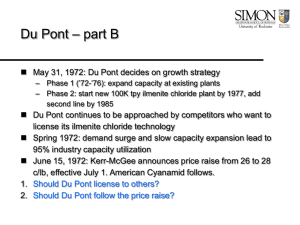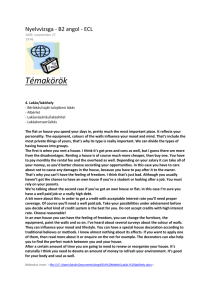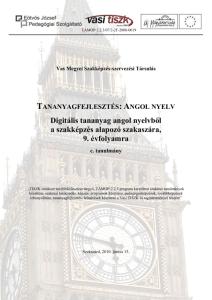C1 angol szóbeli kétnyelvű
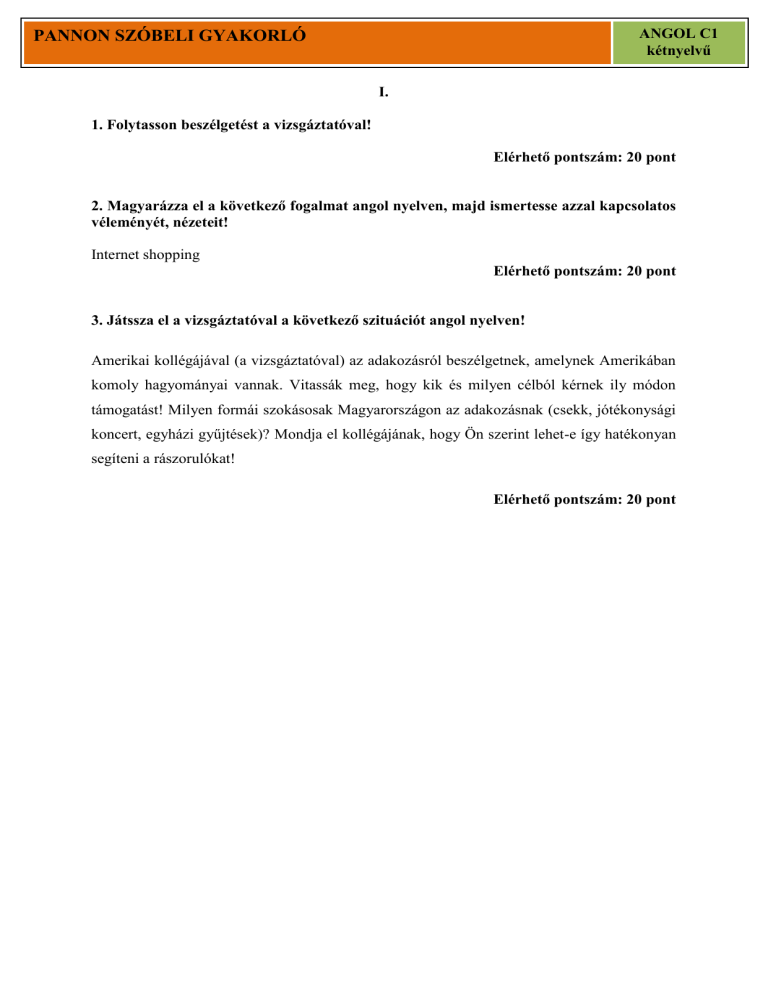
PANNON SZÓBELI GYAKORLÓ ANGOL C1 kétnyelvű
I.
1. Folytasson beszélgetést a vizsgáztatóval!
Elérhető pontszám: 20 pont
2. Magyarázza el a következő fogalmat angol nyelven, majd ismertesse azzal kapcsolatos véleményét, nézeteit!
Internet shopping
Elérhető pontszám: 20 pont
3. Játssza el a vizsgáztatóval a következő szituációt angol nyelven!
Amerikai kollégájával (a vizsgáztatóval) az adakozásról beszélgetnek, amelynek Amerikában komoly hagyományai vannak. Vitassák meg, hogy kik és milyen célból kérnek ily módon támogatást! Milyen formái szokásosak Magyarországon az adakozásnak (csekk, jótékonysági koncert, egyházi gyűjtések)? Mondja el kollégájának, hogy Ön szerint lehet-e így hatékonyan segíteni a rászorulókat!
Elérhető pontszám: 20 pont
PANNON SZÓBELI GYAKORLÓ ANGOL C1 kétnyelvű
4. Olvassa el figyelmesen a szöveget, majd foglalja össze az olvasott szöveg tartalmát magyar nyelven!
Elérhető pontszám: 10 pont
Junk alert for space station crew
The crew of the International Space Station has been forced to shelter in the Russian
Soyuz capsule after a close call with a piece of space debris.
The three crew members are now out of danger and have returned to the ISS. Nasa said news of the debris threat had come too late for flight controllers to move the space station out of the way. The scare comes just over a month after two satellites collided over Siberia.
Officials said the decision to move the astronauts had
About 18,000 objects bigger than been a precaution and that the probability of an impact 10cm are orbiting Earth with the ISS had been low. The space station's operating rules require crew members to be evacuated when debris is detected within a set distance.
Russian Yury Lonchakov and Americans Michael Fincke and Sandra Magnus took refuge for about nine minutes in the Soyuz TMA-13 escape capsule.
A Nasa spokesperson told BBC News that the space agency had been notified about the possible threat last night. The short lead time forced officials to move the crew into the capsule rather than manoeuvring the space station out of the way. The reason for the short notice is unclear, but the small size of the object and its erratic orbital path may have been factors.
It is unclear how many times crew members had been told to enter the Soyuz, but officials said this was "not the first" occasion. Flight controllers have moved the ISS eight times over the past 10 years in order to avoid debris.
The debris was about 1cm (0.3in) in size and part of an old "payload assist motor" that was previously on either a Delta rocket or on the space shuttle, Nasa public affairs officer Laura
Rochon told journalists.
Objects in orbit travel at tens of thousands of kilometres per hour. At these speeds, even a small piece of debris can knock out a satellite or, potentially, cause damage to the space station. Experts recognise a growing threat to satellites and manned spacecraft from orbital debris and several events over the past three years have drawn attention to the problem.
PANNON SZÓBELI GYAKORLÓ ANGOL C1 kétnyelvű
II.
1. Folytasson beszélgetést a vizsgáztatóval!
Elérhető pontszám: 20 pont
2. Magyarázza el a következő fogalmat angol nyelven, majd ismertesse azzal kapcsolatos véleményét, nézeteit!
World heritage
Elérhető pontszám: 20 pont
3. Játssza el a vizsgáztatóval a következő szituációt angol nyelven!
Mondja el külföldi barátjának (a vizsgáztatónak), mi a véleménye a banki szolgáltatásokról! Mostanában igen sok hitelt ajánlanak. Beszéljék meg, mire vesznek föl hitelt a magyarok, mennyire vannak eladósodva! Hogyan juthat egy fiatal pár önálló lakáshoz?
Elérhető pontszám: 20 pont
PANNON SZÓBELI GYAKORLÓ ANGOL C1 kétnyelvű
4. Olvassa el figyelmesen a szöveget, majd foglalja össze az olvasott szöveg tartalmát magyar nyelven!
Elérhető pontszám: 10 pont
Web founder looks to big changes
The founder of the World Wide Web says the pace of innovation on the web is increasing all the time.
Marking the 20th anniversary of his proposal to create the web, Sir Tim Berners-Lee said "new changes are going to rock the world even more". The future of the web lies in mobile phones, he said.
Sir Tim was working at the Cern nuclear research centre, near Geneva, in March 1989 when he proposed to his
Mobile phone Web access will colleagues a hypertext database with text links that would help scientists around the world share information benefit the developing world, says
Sir Tim quickly. His supervisor described the proposal as "vague, but exciting" and the next year Sir Tim wrote the software that allowed users access to information on the already-existing internet.
"Creative people all over the planet started to get involved and I'd get these random e-mails from people in different fields and different countries who decided the web would be a good idea if everybody did it, so they would do it."
Sir Tim said much more was to come. "The web is not all done, it's just the tip of the iceberg... I'm convinced that the new changes are going to rock the world even more," he said.
Mobile phones would form a key part of the web's future, he said. "In developing countries it's going to be exciting because that is the only way that a lot of people will actually get to see the internet at all."
But he also sounded a warning about the emergence of systems that can automatically track a web user's habits and create a detailed profile of the person. "That sort of snooping is really important to avoid," he said.
Google has become the latest firm to launch a system to send advertisements to web users based on their online activities.
